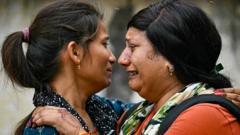The identification of Morgan Beatrice Harris's remains in a Manitoba landfill marks a pivotal moment in a tragic case involving a serial killer targeting Indigenous women. The case underscores the community's calls for justice and the political complexities surrounding the search efforts.
Identification of Remains Brings Closure in Manitoba Serial Killer Case

Identification of Remains Brings Closure in Manitoba Serial Killer Case
Manitoba police confirm the remains found in a landfill belong to Morgan Beatrice Harris, one of four Indigenous women murdered by a serial killer, reigniting debates on systemic injustices.
In a recent development in Manitoba, Canadian authorities have identified human remains discovered in a landfill near Winnipeg as belonging to Morgan Beatrice Harris. The confirmation, which emerged from a search conducted last month, highlights a brutal pattern of violence against Indigenous women, as Harris was one of four victims linked to convicted serial killer Jeremy Anthony Michael Skibicki. Skibicki is serving a life sentence for the murders, which took place between March and May 2022.
Morgan Harris, a member of the Long Plain First Nation, was 39 years old at her time of death. Until this revelation, only the remains of 24-year-old Rebecca Contois had been identified from the remains recovered at the Prairie Green landfill, where local Indigenous groups and families have been pushing for extensive searches. The search for Harris and two other victims named Marcedes Myran and an unidentified woman often referred to as Buffalo Woman became a focal point of political debate during the 2023 provincial election, with the prevailing Progressive Conservative Party criticized for opposing the search due to financial and safety concerns.
The New Democratic Party, under the leadership of Wab Kinew, a historic figure as the first Indigenous premier of Manitoba, had championed the search efforts during their campaigning, thus gaining a hopeful response from the families involved. Following the identification of Harris’s remains, her daughter, Cabria, called it a "bittersweet moment," while also voicing skepticism towards political apologies from the Progressive Conservative Party.
Wayne Ewasko, the interim leader of the party, offered regrets for underestimating the importance of the search for victim's families, stating, “We lost our way in regards to empathy.” However, Cabria Harris firmly noted that without significant actions to substantiate the words of apologies, they remain unconvincing.
The case is reminiscent of past instances of violence against Indigenous women in Canada, including the notorious case of Robert Pickton in British Columbia, which became a landmark investigation due to its scale and the systemic issues it highlighted. The ongoing societal impacts of these tragedies continue to call for urgent reforms in justice and safety for Indigenous communities across Canada.
Morgan Harris, a member of the Long Plain First Nation, was 39 years old at her time of death. Until this revelation, only the remains of 24-year-old Rebecca Contois had been identified from the remains recovered at the Prairie Green landfill, where local Indigenous groups and families have been pushing for extensive searches. The search for Harris and two other victims named Marcedes Myran and an unidentified woman often referred to as Buffalo Woman became a focal point of political debate during the 2023 provincial election, with the prevailing Progressive Conservative Party criticized for opposing the search due to financial and safety concerns.
The New Democratic Party, under the leadership of Wab Kinew, a historic figure as the first Indigenous premier of Manitoba, had championed the search efforts during their campaigning, thus gaining a hopeful response from the families involved. Following the identification of Harris’s remains, her daughter, Cabria, called it a "bittersweet moment," while also voicing skepticism towards political apologies from the Progressive Conservative Party.
Wayne Ewasko, the interim leader of the party, offered regrets for underestimating the importance of the search for victim's families, stating, “We lost our way in regards to empathy.” However, Cabria Harris firmly noted that without significant actions to substantiate the words of apologies, they remain unconvincing.
The case is reminiscent of past instances of violence against Indigenous women in Canada, including the notorious case of Robert Pickton in British Columbia, which became a landmark investigation due to its scale and the systemic issues it highlighted. The ongoing societal impacts of these tragedies continue to call for urgent reforms in justice and safety for Indigenous communities across Canada.





















